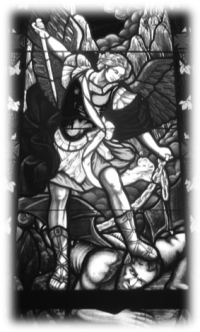Deeper Dive 3 into the Devil and His Angels

OBSERVATIONS ON THE EVIL ONE, THE FALLEN ANGELS, AND DEMONS
AS ACCOUNTED FOR IN THE BIBLE & RELATED TEXTS
The Rev’d. Allen Fisher
Lead Us Not into Temptation
When our Lord Jesus Christ gave His disciples the model prayer, a sixth of its petitions was devoted to being delivered from “the evil one” (see Matt.6:9-13; cf.Lk.11:2-4), and when we read the rest of the Scriptures we discover that the world we live in is not simply neutral territory where a person can either walk with God or just live on their own. Reality is that we can either be in God or we can be a part of the spiritual rebellion begun by lesser gods/angels who were meant to faithfully manage the nations after humanity first abdicated their ruling position under the LORD (Deut.32:8-9;Ps.82). Reality is that the world has been invaded by evil; that evil has worked its way into the hearts of all humanity; and it has pretty much become the infrastructure of society as we know it. Thus, accordingly, the Revelation of God reveals to us not only the supreme God, Yahweh the LORD, but also the parts of His spiritual creation that have rebelled, sought to supplant Him, and corrupted His peoples: 1) The Devil; 2) The Fallen Angels; and 3) The Rebel Sons of God.
The Devil
The first of these parties made its move in the place where the two realms created by God intersected (both the heavenly, spiritual and earthly, carnal): in Eden. In Eden, the heavens and the earth intersected in a very real sense, and the inhabitants of both realms could interact. In the heavens, there was a heavenly assembly, or council, of created-elohim (lit. gods, see Ps.82; Job1:6), and on earth there was to be a growing assembly of human beings (Gen.1:28). Both groups were created by the LORD, placed in their respective realms, and given the honor of representing/imaging God as they faithfully carried out their commissioned tasks.
As one of the heavenly, created-elohim, the Devil, we are told, rebelled against the LORD by seeking the throne of the Most High (the details of which are best described indirectly in Isaiah 14:12-15 and Ezekiel 28:12-17 where we have to read between the lines of the prophets who use the Satan’s downfall to describe that of the earthly kings). His attempted heavenly coup d’état was thwarted and he was cast to the earth by St. Michael the Archangel. Subsequently, Rev.20:2 tell us that he ended up in the Garden of Eden, where he tempted Adam and Eve to be like him and do as he did (Gen.3). His cunning deception of course led to man’s rebellion and fall whereupon they were expelled from God’s presence, barred from the tree of life, and given over to the spiritual being they had heeded. From that point forward, eternal life in God’s presence would only be a free gift offered to those who chose what had been rejected in Eden – trusting, obedient loyalty to Yahweh over any other spiritual voice.
The Fallen Angels & Demons
The garden wasn’t the end of such rebellious activities for either of the realms as other elohim, or fallen angels, would seek to corrupt humanity pitting them against their Creator (Gen.6:1-4,5; 1Enoch 6-8). We are told that some of the sons of God came down to Mount Hermon starting their own rival, earthly bloodlines (the semi-divine nephilim/ giants) and providing humanity with knowledge that would lead to their destruction and inclination toward idolatry. For example, they taught man in his newfound depravity things such as metal forging (leading to weapons), cosmetics (leading to seduction), and astrology (leading them into idolatry). God judged these sons of God by chaining them in the underworld (cf.2Pet.2:4), and flooded the earth wiping out their wicked influences. Yet others would rebel attempting to control the promised land through more rival semi-divine bloodlines (giants) known as the Anakim and Rephaim, which the LORD commanded His people to wipe out in the conquest for the Promised Land and ultimately used David and his men to remove the threat of them. However, as the earthly bodies of the giants were destroyed their departed spirits were damned to the earth as demons (cf.1Enoch 15:8-12).
The Rebel Sons of God
After the nations of humanity began to go the route demonstrated in Babel, God rendered a world-altering judgment – disinheritance. Prior to Babel all of humanity had still been in covenant with God, but this would no longer be the case. All of the nations were placed under sons of God who were to be Yahweh’s placeholders administering heavenly justice in the way they observed Yahweh doing over Israel (Duet.32:8-9), but they chose to go their own way corrupting and enslaving the peoples they were over (Ps.82). Interesting enough we see this concept of nations being allotted to the various gods in Plato (see Critias, 109 [Pluto, The Dialogues of Plato,trans. B. Jowett, 5vols., 3rd ed. {Oxford: Clarendon, 1892}, 3:530]).
We still deal with these today. Although all power and authority has been given to the only, unique Son, these beings are still at work in the world seeking to maintain control over their nations through their established, false religions.
Deliver Us from the Evil One
It would seem the devil originally served in the role of something like a governor of the world, and many of these other spiritual rulers are those angels who were entrusted with governing the nations when Yahweh chose Israel as His own nation in order to restore all nations to himself (see Deut.32:8-9; Ps.82). As chief rebel, he and his devouring influence over the world (cf. 1Pet.5:8) are described in several ways:
- When he is called “Satan” (Hebrew literally meaning “adversary/opponent”; “Devil” is from its Greek synonym which has a connotation of “slanderer”), he is being described as the spiritual power that pushes against God’s kingdom hindering it from being realized among His people (cf.Rev.12:9). He is behind the dark current that is flowing against the kingdom of God and His ways, preventing it from taking root or finding footing (cf.Matt.13:19). His campaign of lies (cf.Jhn.8:44) and influence over culture are what cause people to say to God, “We can’t do that in our situation,” or “Your ways are not enough for our situation.” He controls “the pattern of the world” (i.e., its definitions of identity, justice, and right/wrong, etc., cf.Rom.12:2) of pride, apathy, and hate that the world wants us to fit into and that the Scripture calls us to resist. Through movements and ideologies, he consumes and devours the lives of those who get involved. Biblically, speaking this term is only used to describe him in the New Testament because in the Old Testament “the satan” is a position (think of a court prosecutor, cf. Job1:6-9,12; 2:1-7; Zech.3:1-2) and “satan” is a regularly used adjective and verb being an everyday adversary (cf. Num.22:22,23; 1Sam.29:4; 2Sam.19:22; 1Kng.5:4; 11:14,23,25; Ps.109:6; 1Chron.21:1-2 w/2Sam.24:1-2).
- When he is called “Lucifer” he is being described as the spiritual power behind malevolent political and economic systems (The name is actually only used in the King James and Vulgate Versions of the Bible. Most translations today translate it literally as “Morning Star,” “Day Star,” or “Shining One” because it is using imagery of Venus, the morning star that hangs on in one last stand against the greater star – the Sun – in the morning hours.). Biblically speaking, Babylon is the symbol of man’s corporate rebellion against God and when “Lucifer” is used it is done so to describe him as the political leader of it (cf. Isa14:12). Thus, he is the force behind the kings and kingdoms that oppresses the nations. When this title is used it speaks of him as the king, political and economic ruler/god of the world (cf.2Cor.4:4). He is behind the oppressive political and economic structures God’s people are called to come out from under in their lives (Rev.18:4).
- When he is called “Beelzebub” (Baal Zebub, chief of demons 2 Kings 1:2,3,6,16; Matt.22:24; Mark.3:23; Lk.11:15) he is being spoken of as the strong man that holds men and women in slavery by their own fear of death until the stronger One comes (cf.Matt.12:24-29; Heb.2:14-15). He is behind all of human idolatry – the giving of our allegiance to the lord of the flies, the kingdom of death. Through worldly-wisdom propaganda and media outlets, he spreads misinformation about what provides/insures life, health, and youthfulness, he comes to control the imaginations of the masses so much so that they are unable to trust the LORD. All other sins flow from that. The New Testament’s question is not “Do you know without a shadow of doubt that if you die tonight you will go to heaven” but rather “Whose team are you on? Who is lord? What system are you using for significance, meaning, and self-worth – temporal things (Finances, substance-abuse, attractiveness, good deeds, etc.) or eternal things (biblical revelation)? The wisdom and rule of God or the wisdom and rule of Beelzebub? Faith is more than believing unbelievable things. Biblically speaking faith is about pledging allegiance to and living within a kingdom system.
Because of his original position, Satan had the power of death, or the power to separate man from God as they became enslaved to the fear of it, but this power has been broken by the Incarnation, Crucifixion, Resurrection, and Ascension of Jesus the Christ (the One greater than all angels, Heb.1;2:14-15). Yet, even disarmed of such power, wherever Jesus’ Spirit isn’t welcomed these spiritual forces are still working by a mixed arsenal of fears and temptations. While they are disarmed of any power to directly attack us – they cannot actually make us do anything we do not want to do – they are still alive and at work in the world.
It is this aspect of the world that John in his First Epistle calls us to make sure we do not love, for in so doing we will be robbed of the salvific peace Jesus offers (1Jhn.2:15-17). The deceptive temptations targeted at the desires of our flesh, desires of our eyes, and our pride of life are the mechanisms by which these spiritual forces rule the world and deceive the nations, and they would trick us into consuming our lives in an autonomous pursuit of perceived needs, attractions, and prideful attainments, which would undercut any hope of becoming a little Christ because He himself overcame them.
In so working, the devil never has to deal with us on a one-to-one basis. The fact is, the devil probably doesn’t even know your name. This is true of sin and temptation just as it is in the world of business. If the CEO of Pizza Chain A wants to overcome the part of the market controlled by Pizza Chain B, he does not do it by attacking/tempting Pizza Chain B’s customers personally on a one-to-one basis. No, he does it with a broad campaign luring them into wanting His product. The only person the CEO might confront personally is the other CEO, and biblically speaking this was the tactic of Satan when he personally tempted Christ in both the wilderness and Gethsemane (cf. Matt.4:1-11 & Jhn.14:30). The lower ranks of fallen divine beings are those who engage with humanity in a more of a one-on-one manner. Be it the national “Princes” who rule political kingdoms (cf.Dan.10:11-14), the “Stoicheia of the World” who make local regions fall into a specific line of thinking in accordance with the larger pattern of the world set by the Devil (cf.Gal.4:3; Col.2:8,20), or individual “demonic oppressors” (cf.Matt.12:43-45) the division of humanity from the LORD God and one another is the goal and name of the game.
The Devil in the Details
Much of what we know about the Devil and the other fallen angels has been handed down to us and incorporated into the New Testament from the collection of Second Temple writings known as the Pseudepigrapha. There we find more detail concerning their ranks and rebellions:
- Second Enoch describes the Devil as the highest ranked archangel who out of pride attempted to set himself up to be worshipped as an equal to God and as a result he and his subordinates were cast down and “bound to the air” (29:4; cf. Eph.2:2; 1Jhn.3:8).
- The Testament of Solomon describes the Devil as Baal-Zebub, the prince of the demons (verse 15).
- Wisdom of Solomon (2:23-24) & Life of Adam and Eve both tell us how God, after creating humanity on the earth, commanded the angels to reverence them, but the angel who was to become the Devil refused to on the grounds that he was both greater and older than Adam. Then the angels under his charge followed him into rebellion.
- In Jubilees, the Devil/Satan is named as “Mastemah” (meaning “hateful one,” or literally “animosity”) and is shown to be the chief of the evil spirit. There he is allowed to keep a 1/10th of the demon population for testing mankind’s faithfulness (10:11-12).
- In the Martyrdom of Isaiah, the Devil/Satan (2:3,7), as the leader of the hosts of evil, is named “Sammael” (meaning “blind god”), “Mekira” (meaning “king of evil”), and especially “Beliar” (meaning “useless;” compare to “Belial” in 2Cor.6:15). He is also the “Angel of Iniquity who rules this world” and causes apostasy, sin, magic, and the persecution of the righteous, “dwelling in the hearts” of the rulers of Israel (2:4-11).
- In the Testament of Simeon, the Devil is called “the prince of deceit” who sends forth spirits of envy and jealousy to blind the minds of humanity (1:8).
In the Testament of Naphtali, the Devil is said to “inhabit as his own instrument” evil doers (8:6).




